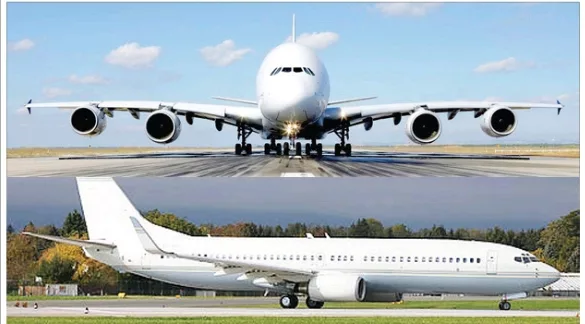Stakeholders in the aviation industry heaved a sigh of relief earlier this month when the government announced its intention to clear the backlog of forex . Foreign airlines, however, confirm that approximately 90 per cent of their $783 million trapped funds are yet to be paid. The minister of aviation and aerospace development, Festus Keyamo, has assured stakeholders that efforts are underway to address the forex challenge in the coming weeks.
How speedy the federal government’s action is to clear airlines’ forex backlog remains to be seen.
Despite assurances from the federal government regarding efforts to tackle the forex backlog, foreign airlines operating in the country are facing a mounting crisis that may lead to their reconsideration of operations in Nigeria. The persistent forex challenges have left a substantial portion of the airlines’ funds trapped, impacting their ability to meet essential operational expenses.
Nigeria’s prolonged backlog in the allocation of foreign exchange has triggered widespread concerns, particularly within the aviation sector. The scarcity of forex has led to delays in remittances for airlines, hindering their capacity to repatriate earnings and manage crucial operational costs.
Foreign airlines operating in Nigeria heavily depend on repatriating funds to cover critical expenses, including aircraft maintenance, leasing fees, and crew salaries. The forex backlog has introduced uncertainty and financial strain, prompting fears among these airlines about the viability of sustaining operations in Nigeria.
The delayed repatriation of funds exacerbates operational challenges for foreign airlines. It disrupts cash flow, hampers the timely procurement of spare parts, and raises difficulties in meeting financial obligations to service providers, impacting overall service quality.
As of early November, no fewer than 40 aircraft belonging to domestic airlines were grounded in maintenance facilities abroad and in Nigeria due to lack of access to foreign exchange from the Central Bank of Nigeria (CBN) to pay the necessary bills, based on a report.
While over 30 airplanes were stranded overseas, a little above 10 aircraft were grounded in Nigeria due to lack of forex to acquire some major spare parts from abroad.
Aside from the grounded planes, some operators are unable to acquire new aircraft engines to replace old ones that have completed their cycles due to dollar scarcity.
With the persistence of the forex backlog, foreign airlines are increasingly weighing the sustainability of their operations in Nigeria. The looming risk of potential pullouts is substantial, as airlines assess the financial viability and risks associated with continuing operations in a currency-uncertain environment.
The withdrawal of foreign airlines could have far-reaching consequences for Nigeria’s aviation sector. The reduction in competition may lead to increased ticket prices for passengers, limiting accessibility and affordability. Furthermore, a diminished international airline presence could adversely affect the country’s connectivity and global travel attractiveness.
Speaking on the forex backlog conundrum, a retired pilot, Francis Akume, who spoke with NATIONAL ECONOMY, said efforts to address the forex backlog demand collaborative actions from both the government and industry stakeholders. He stated that timely interventions, such as a streamlined forex allocation process and coordinated efforts between regulatory bodies and airlines, are crucial to restoring confidence and preventing potential pullouts.
Beyond the aviation sector, the departure of foreign airlines could negatively impact Nigeria’s economy. The tourism industry, trade relations, and the overall perception of the country as an investment destination may suffer, affecting economic growth and international collaborations.
The Central Bank of Nigeria (CBN) has initiated measures to clear the forex backlog, starting with over $10 billion owed to commercial banks and foreign airline operators. However, challenges persist in the effective disbursement of these funds, and airlines report that a significant portion of their trapped funds remains hung.
It is noteworthy that clearing forex backlog would require an industry-wide collaborative effort, according to stakeholders. Dr. Peter Ezeibe, an economist, suggested the implementation of a streamlined and efficient process for the allocation of foreign exchange specifically for the aviation sector. He also called for the establishment of a dedicated unit within the Central Bank of Nigeria (CBN) to oversee and expedite the allocation of forex for airlines, ensuring timely disbursement.
A lecturer at Nnamdi Azikiwe University, Awka, Dr. Felix Echekoba, said there is the need to foster transparent communication channels between the government, regulatory bodies, and foreign airlines to keep all stakeholders informed of the progress in addressing the forex backlog. “Regularly update the aviation industry on measures taken to resolve the issue and provide realistic timelines for fund disbursement,” he said.
Echekoba also called for close collaboration with commercial banks to ensure the seamless disbursement of funds to foreign airlines. “Facilitate direct communication between the CBN and banks to address any challenges hindering the quick release of allocated funds,” he stated.
On his part Stephen Kibaru, a former manager in Nigeria Airways, said flexible repatriation guidelines is important. He called on the government to establish clear and flexible guidelines for the repatriation of funds by foreign airlines, taking into consideration the unique challenges posed by the forex situation. He added that there is the need to provide support and guidance to airlines on repatriation processes, ensuring compliance with regulations.
He further said, “Engage with international financial institutions to explore collaborative solutions and seek support in addressing the forex challenges faced by foreign airlines operating in Nigeria. Leverage diplomatic channels to communicate the importance of resolving the issue for the mutual benefit of all parties involved.
“By implementing these solutions collectively, Nigeria can work towards resolving the aviation forex backlog and create a more conducive environment for foreign airlines to operate effectively within the country.”
As foreign airlines grapple with the forex backlog, the aviation sector in Nigeria is at a critical juncture. Swift and decisive actions are imperative to address the concerns of these airlines, ensuring a stable and conducive environment for their continued operations. The resolution of the forex challenge not only safeguards the aviation sector but also contributes to Nigeria’s economic resilience and global standing.





